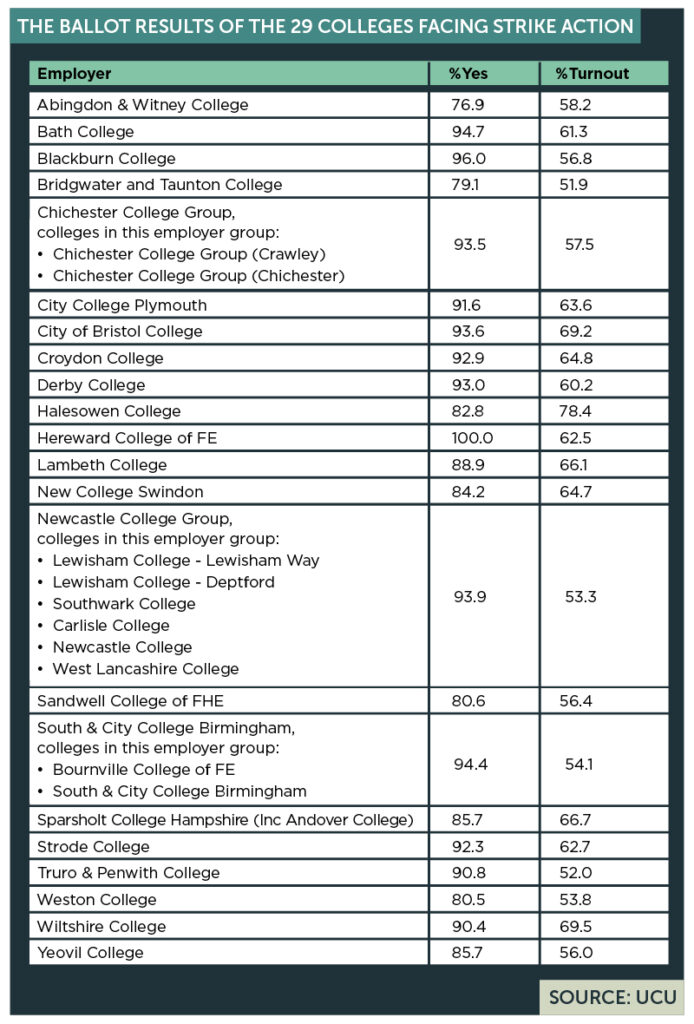Strike action has been confirmed at 29 more colleges across England, bringing the total that will be picketing this autumn to 39.
The University and College Union this week confirmed 29 of the 33 colleges balloting on strikes have agreed to industrial action, held after refusing to accept a 2.5 per cent pay offer recommended by the Association of Colleges.
The UCU wants a 10 per cent rise with a minimum uplift of £2,000.
It reported that the ballot was 89.9 per cent of members voting in favour of strike action, from an overall turnout of 57.9 per cent.
The four colleges that did not vote for strike action were Bournemouth and Poole College, Exeter College, and Sussex Downs and Hastings colleges which are both part of the East Sussex College Group. Those colleges did not meet the 50 per cent turnout threshold.
The 29 colleges will join four in the north west – Burnley College, The Manchester College, City of Liverpool College and Oldham College – which balloted separately and will walk out on September 6 and 7 during college induction week.
Hackney, Havering, Redbridge, Tower Hamlets, and Epping Forest colleges from New City College Group, as well as Barnet and Southgate College, also plan strike action after a separate ballot.
UCU general secretary Jo Grady said: “College staff have shown that they are sick and tired of falling pay and have voted overwhelmingly for strike action after employers offered an insulting 2.5 per cent uplift in pay.
“College workers have had their pay held down so long that the vast majority now face financial insecurity. Yet as the cost of living crisis bites employers want their staff to take a further hit with more below inflation pay rises. This is completely unacceptable and shows exactly why many staff are voting with their feet and choosing to leave the sector altogether.”
Inflation hit 9.1 per cent in May, while cost of living pressures from increased energy bills, food shops, fuel and council tax among others have hit people’s bank balances.
The UCU said staff pay at colleges is now 35 per cent below inflation since 2009, and referenced its report which said that seven in 10 would leave the industry unless pay and conditions improve.
Capital City College Group averted strike action after last week agreeing to a 9 per cent rise for those on £30,000 or less from August.
The AoC upped its pay offer from 2.25 per cent to 2.5 per cent in June, rejected by the UCU as being “totally unacceptable”.
David Hughes, AoC chief executive said it is “disappointing” that unions are intent on strike action in the autumn, particularly because of the impact it might have on students keen to start their studies.
“I would urge the unions and their members to avoid disruption during the important recruitment period at the start of term. This would be counterproductive as anything which decreases the number of enrolled students would impact on colleges ability to increase staff pay,” he said.
“Having said that, the cost of living crisis is biting hard for college staff, as it is for their students, the colleges themselves and many others in society. That’s why we continue to work hard to persuade the new ministerial team at the Department for Education of the urgency in winning more funding and giving flexibilities with existing budgets to boost college staff pay.
“We will continue to make the case for improving staff pay as it is vital for colleges to be able to retain and recruit their teaching talent.”


















Call me a cynic, but isn’t it funny that Mr Hughes always comments that teachers shouldn’t ask for a pay rise, but is almost always silent about executive pay which has ballooned on his watch. I guess it must be justified, given his “I know all of these CEOs personally and I know they care passionately about learners” article…